Over 650 attendees from 40 countries attended the 2nd International Consultation on Christian Persecution, organized and hosted by the Hungarian Government to address the pressing crisis of global Christian persecution.
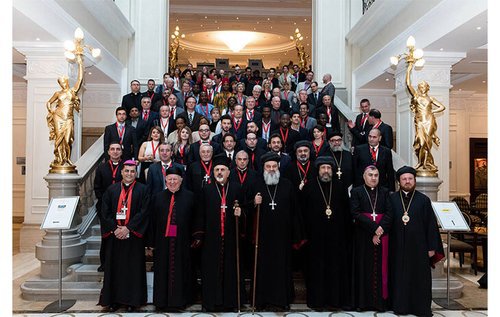
Between 26-28 October the 2nd International Conference on Christian Persecution organized by the Hungarian Government, took place in Budapest. Church leaders and representatives from the Middle East and Africa as well as other parts of the world gathered to find answers and solutions “to the most neglected humanitarian and civilizational crisis of our time” according to the organizers.
„Beyond raising international awareness, the primary aim of the conference is to foster closer cooperation between governments, governmental and non-governmental organizations and other concerned actors. Only through the coordination of resources, efforts, and through joint endeavour is it possible to defend Christian communities living in crisis regions from the ever wider phenomenon of religious persecution and to support their return to their homelands.”- reads the introduction of the conference.
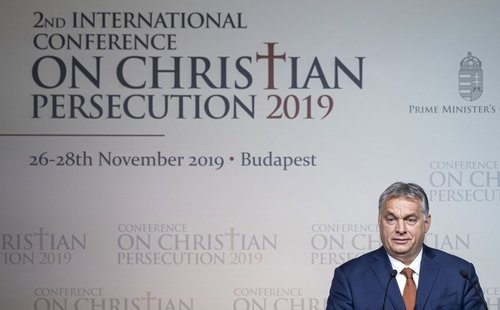
At the opening of the conference, Prime Minister Viktor Orbán addressed the audience saying: “ We are giving persecuted Christians what they need: homes, hospitals, schools, and in return we are being given that which Europe is most in need of: Christian faith, love and perseverance”.
The three-day consultation gave a chance to encounter representatives of hundreds of Christian communities living in minority position and experiencing discrimination or persecution as well as church and political leaders from the West.
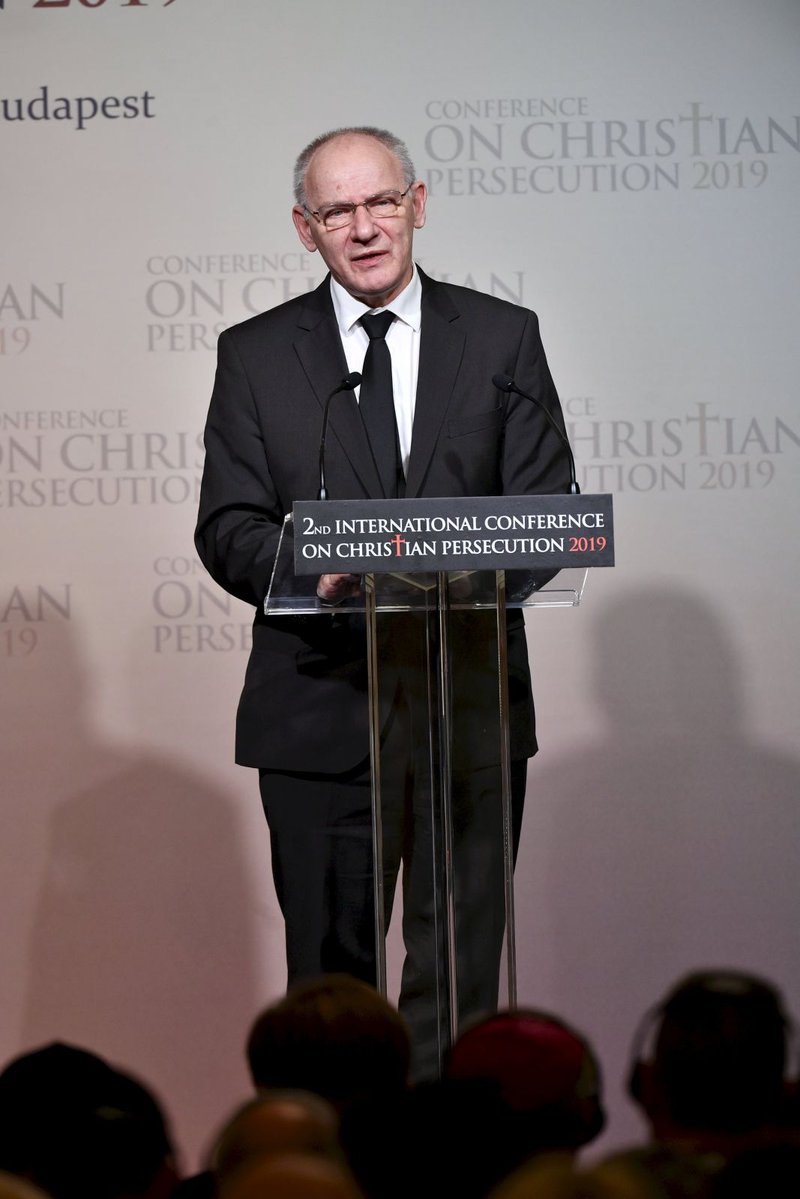
Leaders of the Hungarian Churches greeted the Conference. Beside Cardinal Péter Erdő and Bishop Tamás Fabiny of the Evangelical Lutheran Church, Presiding Bishop István Szabó addressed the attendees as well. In his speech Bishop Szabó referred to the church of Thessalonians using the words of Apostol Paul “we really live, since you are standing firm in the Lord”. These are the Apostol’s words to the persecuted Christians, when he heard that they stayed firm in their faith even if everything seemed to force them to deny Christ, the Savior. As the Bishop said, this is always at the core of every kind of persecution –whether it is based on economic, cultural, ethnic or civilizational reasons. Bishop Szabó thanked governments, politicians and those in charge of heavy decisions who supports the persecuted Christians and make a financial sacrifice for them. He also thanked the persecuted Christians for their bravery for sharing their life and story with us and thanks to everyone who continuously prays for the cause of Christ. “We live so you may live and if you live, so will we.”-said the Bishop
Among the church representatives, leaders of the two largest Reformed church community and partners of RCH were attending the conference.
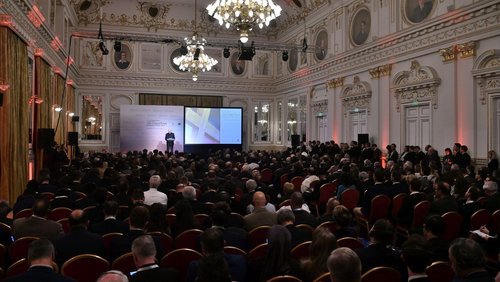
In his speech, Rev Josep Kassab, General Secretary of the National Evangelical Synod in Syria and Lebanon (NESSL) and Head of the Evangelical Community of Syria and Lebanon talked about the case and cause of the Christians in the Middle East, the community that is one of the oldest in the world but now its existence is at stake. The Christian community, which once made up 1/5 of the total population in the Middle East, today their number is less than 5% in the region. Rev. Kassab said the Christian communities are the most vulnerable in the region, which has neither political ambitions, exclusive political parties, nor separatist nor federalist plans. They do not leave their country because of what political system is in their country. However, they leave the country when the institution of state is weakened by genocide, civil war, unjust sanctions or direct military invention. The Christian community cannot stay in their country if that is governed by Islamic law referring to ISIS and its sister Islamic groups in Syria. As he said, the Christians want to live in a stable civil state equally with one and others.
He also raised his voice against demonizing Islam and Muslim people saying Christians and Muslims have been living together for 1400 years. He distinguishes Islam and the political “jihad” Islam that creates parallel reality alongside mainstream Islam.
Closing his speech, he emphasized the importance of education and mentioned schools run by NESSL, which are promoting diversity, acceptance of the others and moving away from speech of hate and violence. As he said, before a violent action takes place, extremism appears in the system of thoughts.
“Religions belongs to the deepest heart of the people in the Middle East. However, it can be either a gift of God or it can be turned to a curse from evil. It is our responsibility; Governments, churches, mosques, schools, political parties to protect this gift. Otherwise, our fight for heaven will make us loose the earth. “-concluded his speech Rev Kassab.
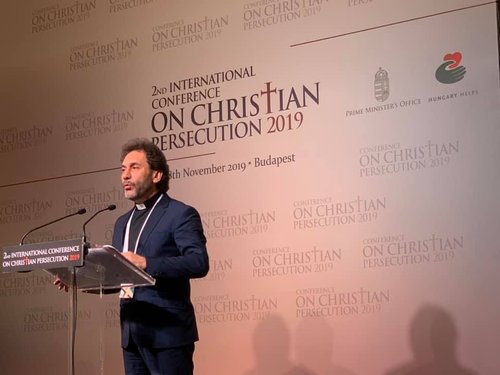
Rev. Harout Selimian President of the Armenian Evangelical Community in Syria spoke of his experience in Aleppo, Syria. He was speaking about the people that are suffering everywhere in the world due to political and economic situations which has become so common that we have become immune to it. He called this conference a “wake up” call to all governments.
He said persecution started from the very first day of Christianity, as it is written in the Bible, through a divine intervention Saul who was persecuting Christians became Paul, the World Evangelist. This story also encourages Christians today that God takes care of them. Not politicians, but God is in control.
As a Syrian Armenian he reminded the audience of the Armenian Genocide under the Ottoman Empire and that the persecution did not end after more than 100 years, and the Armenian people do not receive a just decision in that regard, neither did the Ottoman Empire of that time, nor has the Turkish Government today been questioned on what has been done to the Armenians throughout history. He also raised the issue of not being able to stop Turkey from invading the north-eastern part of Syria.
He also thanked the Hungarian Government for its support through the Hungary Helps program today as well as all churches and NGOs in western world that during the war contacted and listened to them and stood up for them.” He also said that the 1st International Conference on Christian Persecution two years ago gave a hope for them that still in the West there are political actors who are ready to give a fair platform to the churches and Christians in order to voice their sorrows and their equities.
In his speech, he mainly focused on the fact that Christianity is one of the most persecuted religions all over the Earth. He stressed that freedom of religion, like all freedoms of thought and expression, is imperative. He said, “our beliefs help define who we are and serve as a foundation for what we contribute to our societies. However, today, many people live under governments that abuse or restrict freedom of religion. Christians in such areas face persecution, suffer deeply, and are denied basic freedoms that humans should be entitled to”. At the end of his speech, he urged the Governments to take steps to prevent religious discrimination and persecution by taking a firmer stance for religious freedom and persecuted minorities.
“We have to act wherever we are. We have to act in prayer, we have to act physically. We should know that the war and the bloodshed should end… We should act and we should pray for children traumatized by violence and families who have lost their loved ones. For those who have been kidnapped whether they are Christians or Muslims. For courage and unity for the church leaders and for all Christian denomination.”- said Rev Selimian.
On the closing day of the conference, the Budapest Report on Christian Persecution 2019 was presented, that is analysing questions of security policy, legislative process defending Christians and the role of the religious communities and presents the situation of Christians living in Northern Iraq, North-Korea, Sri Lanka, in Nigeria, Africa.
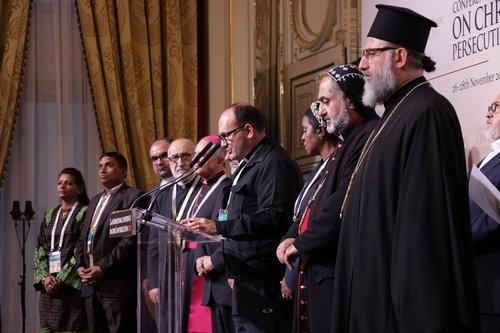
At the conference the new initiatives of the Hungary Helps program was also announced. The program that also helps our Reformed partner churches’ projects in Syria, will support the reconstruction of 30 more church building in the Middle East which were ruined due to armed conflicts; education of African children in need as well as the expansion of the Museum on Christian presence in the Holy Land.
As a side program of the International Consultation, the Reformed Church leaders also attended the Roundtable Dialogue on Religious Freedom in the Middle East and Africa on the 25 November . Rev Selimian also took part in the Christian Democrat Foreign Affairs Club event as a guest speaker where he presented the current relevancies on Syria and the current state of Christianity in the region of Aleppo.
On the 26th November Presiding Bishop István Szabó hosted a Reformed reception honouring the Protestant church leaders, representatives and theologians attending the Consultation. The common prayer followed by a festive reception took place in the RCH Synod Hall and gave a chance for discussion and conversations among RCH ministry leaders and Reformed partners from the Middles East, Africa and Western Europe.
Based on kormany.hu, MTI, Reformatus.hu
Photos by MTI, facebook
Written by Ecumenical Office